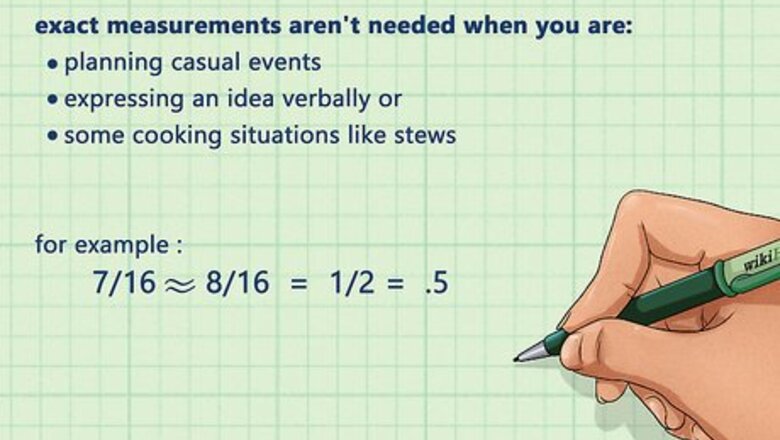
views
Estimating Fractions Mentally

Decide if the estimation is appropriate. Estimating a fraction will give you the gist of the fraction. However, you'll seldom guess the exact answer with it. If you only need a general idea of the answer, estimations are helpful. However, if you need to give an exact answer, solve your equation with exact measurements. A good estimation will convey the general idea across quickly, and won't attempt to pass itself off as an exact answer. Examples of situations that favor estimations include planning casual events (roughly gauging supplies needed), expressing an idea verbally (getting the idea across without the nitty-gritty details) or some cooking situations like stews, where exact measurements aren't needed in the final product.
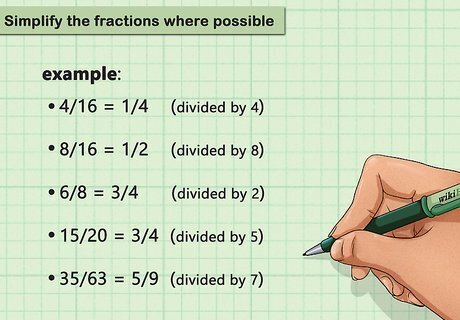
Simplify the fractions where possible. Fractions will always be easier to deal with mentally if you simply them to their lowest common denominators. A fraction listed as 4/8, for example, can be expressed as 2/4 or 1/2. These are different ways of expressing the exact same fraction. It's a good idea to simplify your fractions however possible in order to make your estimating easier. Find a number you can divide the top and bottom half of a fraction by equally. Dividing them by the same number will reduce the size of the numbers, while keeping the proportions intact. Smaller numbers are generally easier to work with than big numbers. If all of the numbers included share a common denominator, it's possible to divide them by that root accordingly. For example, 4/16 and 6/8 could be divided by 4 and 2 respectively. This would result in 1/4 and 3/4. Generally speaking, if both the top and bottom of your fraction are even, you can divide both sides by 2. Both sides will be only half as big as before, and the proportion will remain the same. Make sure you keep both sides of your fraction whole while dividing. Making fractions out of fractions by dividing denominators improperly will make your fraction much more frustrating to deal with.
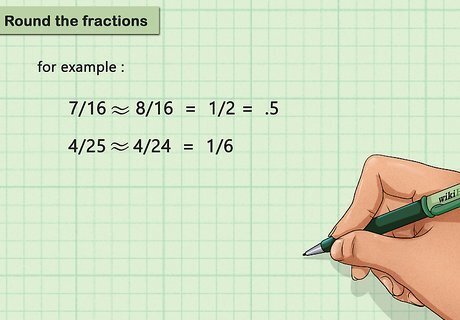
Round the fractions. Rounding fractions makes them easier to deal with. If you have a fraction that can't be simplified as is, moving it slightly up or down can allow you to simplify at the cost of the "exact" answer. Rounding fractions up or down will depend on a lot of things, specifically whether you're dealing with a lot of very specific fractions, and whether there are few enough parts to still make sense. "Rounding" a fraction means bringing it slightly up or down so that the fraction may be simplified. For example, 7/16 may be a tricky fraction to visualize mentally, but if you round it up slightly to 8/16, it becomes exactly half (1/2) of the whole.
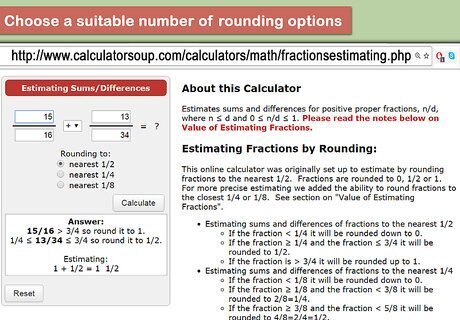
Choose a suitable number of rounding options. If you're intent on using mental math, it's a good idea to try to round your fractions down to proportions you're most comfortable with. Because personal skills with mental math will depend on the individual, you can make the rounding as big or small as you'd like. Rounding to halves (0, 1/2, 1) only makes sense for the simplest fractions, while more complex proportions will benefit from a greater number of rounding options. Rounding your fractions into smaller portions (like eighths or sixteenths) may be more difficult depending on your level of skill, but you'll find your answer is closer to the real answer.
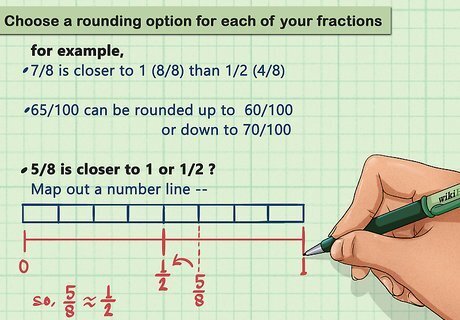
Choose a rounding option for each of your fractions. Most of the time, a fraction will be closer to one of its adjacent rounding options than the other. 7/8, for example, is closer to 1 (8/8) than 1/2 (4/8). In some cases however, it may lie somewhere in the middle. A fraction like 65/100 can be rounded up or down to 60/100 or 70/100. You can make a decision on which you think best represents the data given. Mapping out a number line will help indicate visually what rounding option a fraction is closest to. Although it may go without saying, you won't need to do anything to fractions that already fall on one of your rounding options.
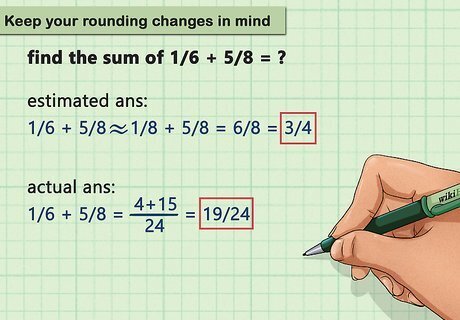
Keep your rounding changes in mind. Although rounding fractions up and down could be helpful for the sake of estimating, it's important that you don't take these new proportions as an accurate report of the real proportions. Keep the original, precise fractions at hand. Having both the exact and estimated versions available is useful, because you'll be able to communicate the idea easily, as well as back it up with the hard data when needed.
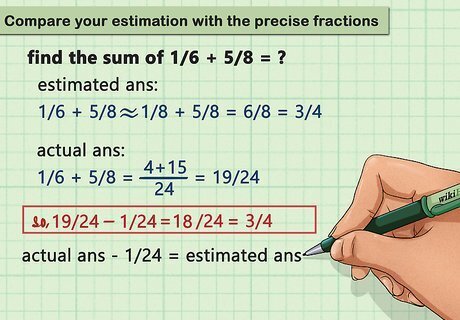
Compare your estimation with the precise fractions. Once you have a rounded, simplified estimation you're comfortable with, you can sharpen your estimation further by propping it up against the original fraction. This way, you can identify how your estimate might vary from the real number. While an estimate is a great way to visualize or think broadly about the data, you should reflect on how close your fraction really is. A 7/16 fraction could be rounded up to 8/16 (or 1/2). 7/16 may still be seen roughly as a half, but you should remember that the simplified version is slightly more than the real number. A mathematical way of expressing this would be: (1/2 - 1/16).
Estimating Fractions Visually
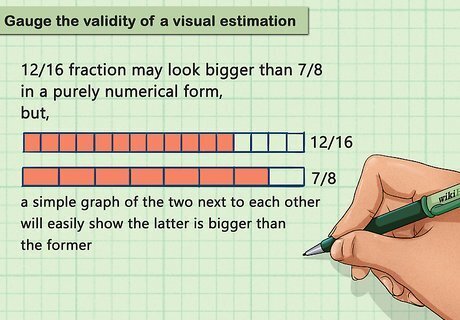
Gauge the validity of a visual estimation. Communicating a fraction visually makes it apparent to other people. They're a perfect way to express proportions to others, especially if those people don't have a mathematical background. Visual estimations are best-suited for comparing one fraction against another. The human eye is trained to compare and measure things, even without mathematical experience. Putting something in visual terms helps to ease the mind from purely abstract, numbers-based thinking. Visual estimations are also perfect for use in casual, "real life" settings. For example, a 12/16 fraction may look bigger than 7/8 in a purely numerical form, but a simple graph of the two next to each other will easily show the latter is bigger than the former. The two main types of visually-illustrated fractions are line and circle graphs. Lines are best for measurements, whereas circles (or "pie charts") are best for showing proportions.

Choose a visual model. Different visual models will fit different people. Whether you want to use a pie chart, rectangle, chart or some other way of visualizing your proportions, an illustration of a fraction will give you a reference point to think about it in more concrete terms. Different proportions can be indicated by different shades or colours. For example, two shaded thirds of a pie circle indicates a 2/3 fraction. It's a good idea to play around with a few visual models using the same set of fractions. This will show you how different models can represent the same thing.

Illustrate fractions with physical pieces. Using chocolate pieces, building blocks or even pebbles, you can estimate your fractions by setting different pieces into groups. A fraction with 50 parts (17/50+33/50) can be expressed by separating 50 pieces into two groups. With that, you'll be able to visually see how one fraction sizes up to the other. By illustrating two or more proportions next to one another, you'll have an easy visual reference as to which fractions are biggest, and which are smallest. The human eye will be able to identify the distinction almost without thinking, so it's a nice way to communicate it in clear terms.
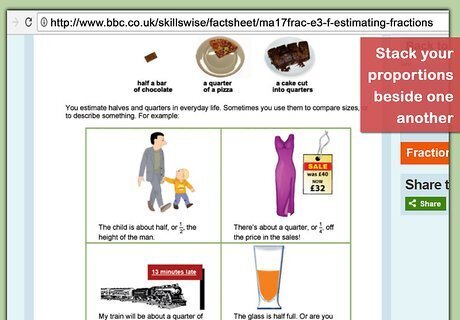
Stack your proportions beside one another. Relative fractions are all around us, and we often make choices based on estimating fractions without even thinking about it. If you're looking for a way to practice your fraction estimating, put two items of different heights next to each other. From there, try to guess what proportion of the larger object's size is matched by the smaller one. You can check your answers by placing a ruler and measuring the appropriate dimensions of your items after the fact.

Make a pie chart. Pie charts are a great way of expressing proportions in a visual way. If you're a visual thinker, it's a good idea to work your rounded fractions into a circle. From there, you can express your estimation without having to rely on rounded numbers that may not be accurate. Unlike graphs (which tend to rely on exact data) a pie chart is supposed to be a quick way of showing visual data. It's generally easier to visually analyze the parts of a circle than other visual models, as a full circle represents a whole.













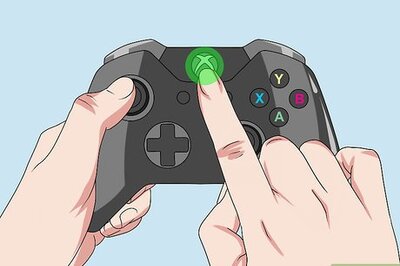


Comments
0 comment